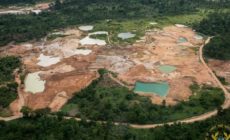According to BMI, a research outfit of ratings agency, Fitch, increasing economic ‘pull factors’ will actually encourage the expansion of illegal mining in the short term.
“We highlight Ghana as the region’s illegal mining hot spot in 2018 and expect illicit mining activity, locally known as ‘galamsey’, to continue rising in the country over the coming quarters. Despite the fact that the New Patriotic Party (NPP) government has pledged to crackdown on illegal mining activity, banning the practice in early 2017 and establishing a special taskforce to dedicated to enforcing the ban, we envision increasing economic ‘pull factors’ will actually encourage the expansion of illegal mining in the short term”, it stated in a report.
‘Galamsey’ is prevalent in southern and western Ghana, which is both the main area of cocoa production and the location of most of the country’s gold reserves.
The report added that “We expect that the 14 percent decline in cocoa production in 2018 – due to a surplus after a bumper harvest in 2017 – will drive an uptick in farmers selling or leasing land to miners.” Continued, it noted that the expected hike in gold prices in 2018, will further incentivize workers in the struggling agricultural sector to take up mining themselves or to sell or lease their land to miners, emphasizing “as a result, we expect gold production in Ghana to grow at a solid average pace of 8 percent in 2018, up from a decline of 5 percent in 2017.
The ministerial taskforce on illegal mining chaired by the Lands and Natural Resources Minister, John Peter Amewu had earlier announced it was expected to review the ban on ‘galamsey’ soon. It is however unclear whether the ban will be lifted or not.
Meanwhile, illegal mining activity in Sub-Saharan Africa will remain widespread in the coming years as prices of key commodities rise and poor, local communities remain dependent on subsistence-level economic activity.
International and national regulations aimed at curbing illegal mining will see varying levels of effectiveness across commodities, while gold will continue to dominate illicit activity, the BMI report noted.
“Illegal mining activity will remain widespread across Sub-Saharan Africa usually in the form of artisanal and small-scale (ASM) mining operations, although these types of operations also include legal subsistence miners. Defined as mining without state permissions, in the absence of land rights or without a relevant permit, illegal mining poses significant economic and environmental risks to local mining markets”, it reiterated.
Miners involved in illicit mining activity are known to use environmentally unfriendly refining methods that pollute water systems, leading to social opposition, and can attract criminal activity which undermines the operating environment for legitimate operations.
Presently, gold is hovering around US$70 per barrel.
Fitch predicts resurgence in ‘galamsey’
- Posted on
- Comment
 ILLEGAL mining, popularly called ‘galamsey’ is expected to thrive in the country in the coming months despite government’s onslaught on the menace.
ILLEGAL mining, popularly called ‘galamsey’ is expected to thrive in the country in the coming months despite government’s onslaught on the menace.
By Augustine AMOAH










 (Selorm) |
(Selorm) |  (Nana Kwesi)
(Nana Kwesi)